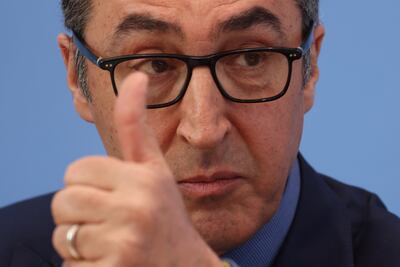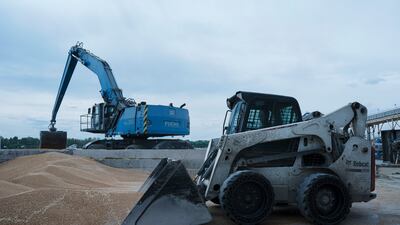Germany on Thursday called on Russian President Vladimir Putin to honour a UN-brokered deal to allow Ukrainian grain exports via the Black Sea, which are crucial for the world’s food security.
German agriculture minister Cem Ozdemir described Russia’s repeated threats to not renew the so-called Black Sea Grain Initiative when it expires on May 18 as “simply irresponsible”.
“Putin is again deliberately using the Black Sea agreement as a means of pressure to assert his own interests: destabilisation and an end to western sanctions,” Mr Ozdemir told German news website t-online.
Last month, Russia agreed to extend the Black Sea Grain Initiative by 60 days instead of 120 days as initially agreed when the deal was brokered last July by the UN and Turkey.
Russia says that western countries have not respected a parallel agreement to allow the exports of its own agricultural products.
Such exports are not sanctioned, but Russia says that restrictions on payments, logistics and insurance slow down shipments.
Moscow's key demand has been the restoration of access to the Swift financial messaging system for Russian state-owned agriculture-focused bank Rosselkhozbank.
JPMorgan Chase & Co this week reportedly received permission from the United States to process payments for Rosselkhozbank.
This would not replace a reconnection of the bank to the Swift system.
Data shows that Russian agricultural exports mostly increased last year.
Earlier this week, Russia’s Foreign Minister Sergey Lavrov said that the UN’s attempts to convince western countries to make Russian agricultural exports possible had made no progress.
Speaking at the UN in New York, Mr Lavrov claimed that the deal has reached a “dead end”.
Russia and Ukraine are among the world’s top grain producers.

Mr Ozedmir said that Russia’s position puts some countries at risk of being unable to buy enough food.
Ukrainian grain must arrive where it is needed, “namely in the countries of the Global South,” the German minister said.
“Russia must live up to its commitment to the world.”
Ukrainian grain exports have also caused divisions among European Union countries and threatened to derail their quasi-unanimous show of support to the war-torn country.
Several Eastern European states recently imposed restrictions on Ukrainian agri-food imports after local farmers complained that Ukrainian products have flooded their markets and made it impossible for them to sell their produce.
Poland, which is especially under pressure from its agricultural lobby in an election year, banned all grain imports, but agreed to allow grain to transit the country after discussions with Ukraine.
“Poland is the number one country in the EU in terms of assistance to Ukraine, but this cannot be done at the expense of Polish farmers,” said Polish state secretary for agriculture Janusz Kowalski, quoted this week by the Financial Times.
Poland is one of Ukraine’s strongest military allies and runs EU training courses for Ukrainian soldiers.
Its unilateral ban on Ukrainian grain imports caused dismay among other EU countries, who fear that it may weaken the bloc’s unity and undermine Ukraine’s economy.
“We are worried,” an EU diplomat told The National.
The ban is “illegal” and “contravenes the unity of the internal market, our trade policy, and the common agricultural policy”, the diplomat said.
The EU Commission is preparing a €100 million ($109.32 million) compensation package for farmers in five eastern European states: Bulgaria, Poland, Romania, Hungary and Slovakia.
The Commission has described restrictions on Ukrainian imports as unacceptable.
Discussions are ongoing and will continue on Friday during a meeting of EU ambassadors.
A Slovak diplomat denied media reports that the five countries would call for the re-introduction of tariffs on agri-food products. "We are discussing possible specific, targeted measures," they said.
The diplomat added that "countries bordering Ukraine, including Slovakia, are exploring ways together with the Commission how to best support Ukraine as well as stabilize our domestic market with specific products."
A Bulgarian diplomat said that his country "just wants to protect [its] farmers from unfair competition."
"Certainly we support Ukraine in these difficult time."


